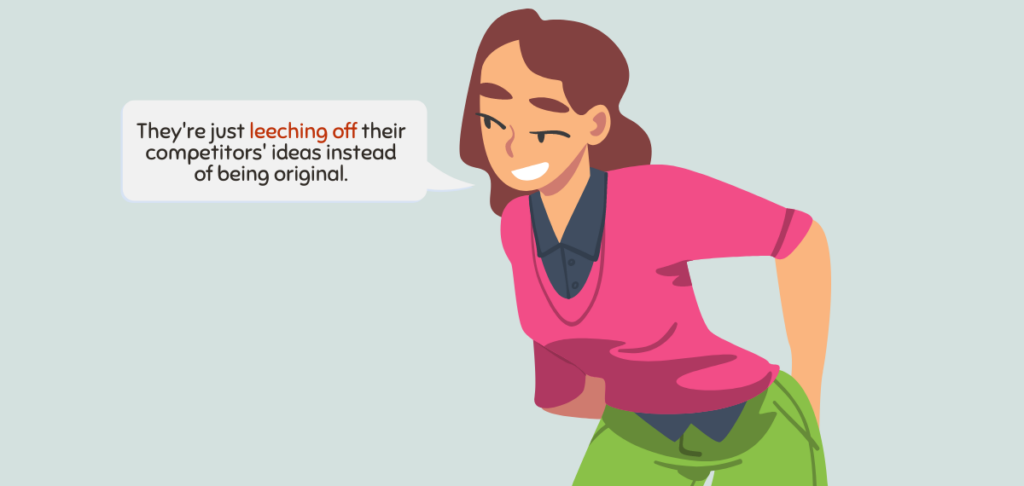Riding coattails means benefiting from someone else’s success or reputation without putting in much effort. A person who rides someone’s coattails is usually considered unable to succeed independently.
Idioms such as riding coattails are expressions in the English language where the meaning of the phrase is different from the literal meanings of the individual words. They add color, depth, and cultural context to the language, enriching communication by conveying complex ideas in a concise and relatable manner.
In this article, I delve into the meaning of riding on coattails, its origins, variations, and related expressions. I also provide examples and tips for effective usage so that you’ll learn how to use it correctly. You can even test your newfound knowledge with a short quiz at the end. Keep reading to explore the nuances of this idiom.

What Does the Idiom Riding Coattails Mean?
The idiom to ride on someone’s coattails means to become successful by attaching yourself to another’s success. When you’re riding coattails, you’re essentially taking advantage of someone else’s hard work, achievements, or reputation to gain benefits or recognition for yourself, often without contributing much of your own effort.
Collins Dictionary defines the idiom ride on someone’s coattails as “to have one’s success dependent on that of someone else.”
The term coattails refers to the lower extensions at the back of a jacket. When we use the idiom riding coattails, we’re painting a picture of someone clinging onto these flaps, essentially being pulled along by someone else’s actions or success, all without making any effort of their own.
It’s common to see individuals benefiting from others’ efforts. I have witnessed colleagues, whether in retail or upper management roles, riding the coattails of a group effort and earning praise for the work people under them did. This behavior, though, is dishonest, unprofessional, and often a factor in employee dissatisfaction and turnover.
Variations of Riding Coattails
Here are some variations of the idiom:
- Ride on coattails
- Riding on someone’s coattails
- Ride coattails
- Ride the coattails
- On the coattails
How Is the Idiom Riding Coattails Commonly Used in Context?
The idiom riding coattails is a colorful expression that describes benefiting from someone else’s success or reputation without making significant efforts. This section explores various aspects of how this idiom is commonly used in different contexts:
What Are the Different Ways to Use the Idiom Riding Coattails?
- In politics: Refers to a candidate or party member gaining support or electoral success by associating themselves with a more popular or influential figure within their party. “The young politician was accused of riding the coattails of the party leader to secure his own seat in the election.”
- In the entertainment industry: Describes an individual leveraging someone else’s success or fame to advance their career. “The aspiring actress hoped that by dating a famous actor, she could ride his coattails to get better roles.”
- In business and entrepreneurship: Refers to someone capitalizing on the accomplishments or reputation of others to achieve personal success. “The inexperienced entrepreneur managed to secure investors by riding the coattails of his well-established business partner.”
- In sports: Describes a player benefiting from the skills or achievements of their teammates without significantly contributing any effort. “The striker was accused of riding the coattails of his teammates, who created scoring opportunities for him.”
- In personal relationships: Refers to someone relying on their partner’s accomplishments or social connections. “Some people accused her of riding her husband’s coattails, as she only gained prominence due to his influential family.”
Where Can You Find Examples of the Idiom Riding Coattails?
The idiom is widely used in different forms of media, including:
- Political commentaries
- Entertainment news and gossip
- Business and entrepreneurship discussions
- Sports analysis and commentary
- Personal stories and anecdotes
When looking for examples of the idiom in print, consider editorials and reports related to politics and business, like in this example:
“Historically, it has been a strong office market, and it seems like sites have been hard to come by to build hotels, so I think with medical offices also experiencing growth in the last five years, the hospitality scene has been following the coattail effect.” (The Knoxville News Sentinel)
What Are Some Tips for Using Riding Coattails Effectively?
Using the idiom riding coattails effectively in conversation or writing can add depth and creativity to your communication.
- Understand the context: Recognize that it refers to benefiting from someone else’s success or achievements.
- Appropriate usage: Use the idiom when someone is taking advantage of another person’s accomplishments or reputation.
- Use figurative language: The idiom adds color and imagery to your language, making your communication more engaging and memorable.
- Consider the audience: Provide context or explain its meaning to avoid confusion.
- Tone and intent: The idiom can be used humorously, critically, or as a commentary on opportunistic behavior.
- Variety and creativity: You can use it in metaphors, analogies, or as a descriptive element to enhance your storytelling or writing.
- Balance with clarity: Use the idiom judiciously, balancing it with clear and concise language to avoid confusion.
What Is the Origin of the Idiom Riding Coattails?

The idiom first appeared around 1600 in a different form—on one’s own coattail. This meant to do something at one’s own expense. The current idiom in use, ride someone’s coattails, did not come into use until the mid-1900s and is generally considered an American term.
The coattail effect is the phenomenon wherein a popular politician in higher office attracts votes for candidates of the same party in lower offices. This usually occurs because voters who greatly support the popular politician turn out to cast ballots in greater numbers, and voters generally support the same political party across the board.
How Did the Idiom Evolve Over Time?
Over time, the idiomatic phrase riding coattails has transitioned from signifying self-reliance to leveraging someone else’s success. While earlier it emphasized actions borne out of personal effort, today it reflects gaining advantage or success by associating with a successful person or initiative.
What Are Some Related Terms to the Idiom Riding Coattails?
To further your understanding of the idiom, consider some alternative terms to help you work it into your own materials.

Synonyms
- Piggybacking
- Leeching off
- Capitalizing on
- Exploiting
- Taking advantage of
- Benefiting from
Antonyms
- Self-sufficiency
- Personal achievement
- Independent success
- Individual accomplishment
- Self-made progress
- Autonomous advancement
Riding Coattails: Test Your Knowledge!
Choose the correct answer.
Let’s Review
The idiom riding coattails captures the concept of benefiting from the success, accomplishments, or resources of others. It implies a reliance on someone else’s achievements to gain advantages or recognition.
The use of coattails idiomatically has been around since the 17th century. Riding on the coattails of someone to gain influence started in politics.
Now that you have learned all the details about this idiom, you should confidently apply it to your own materials. And, if you want to continue building your English skills, explore some of the many other articles about idioms that Grammarist has to offer!
Check out some others we covered:
